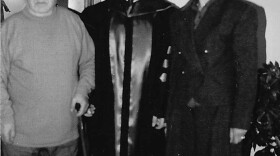I was born in Kansas City, Missouri March 22, 1943. An interesting story from my childhood was that I was born in the midst of WWII, and my mother was the oldest out of five sisters. Three of her sisters' husbands were in the war as well as my father, and my father didn't see me until I was three years old because he was in Europe.
He was stationed in England, he was part of the D Day Invasion, and he was never in battle. He was something called a telegrapher clerk and was on ship relaying the messages to how the battle was going.
My cousin, who was 18 months older than me, spent a lot of time at grandmother’s house. My grandmother took care of me and her as well as the rest of the family while our mothers were out helping with the war. We all lived in one house until my mother saved enough money and just said to her father, who was a realtor and a postman, "Go buy the house for sale up the street. I'm not even going to look at it." She just felt like people were living on top of each other, so that's what we did.
Life was much different than what it's expected of children today. I think we grew up a lot faster because of the times that we lived in. I also had the benefit of living on acreage. We moved from Kansas City and lived on a little farm that had twenty acres on it and my father always had another job as well, but we pretty much survived on our food we grew and the animals. We had our cows that provided our milk. I learned a lot of things and we had to work pretty hard. I had my first job when I was thirteen detasseling corn. I made thirty cents an hour and we walked in muddy irrigation ditches up to my mid calves.
I never lived in just one place my whole life. I lived in a big city, Kansas City; I lived in a little college town, Tarkio, Missouri; then moved to a railroad town, Missouri Valley, Iowa, where I graduated high school. I went to college in Cedar Falls, Iowa, and Omaha, Nebraska, then lived in a little town called Dow City, Iowa. I've lived in Sioux City longer than I’ve lived anywhere in my life.
When I lived on the farm, I learned to take care of big animals like cows and pigs, and small animals like chickens. I picked green beans and apples and cherries, and learned a lot of things from 4-H. Everything on our farm was done by hand by our family.
People trusted each other more when I was growing up than they do now. We used to leave on vacation and leave our house unlocked. We left our keys in our cars. There's a phrase, "It takes a village to raise a child" and that was true in our town. Stories about what you had been up to often made it home before you did.
We shopped in Missouri Valley for basics, but if our family had any specialty needs, we shopped in Omaha. Now, most people go to Omaha to do their shopping, so the stores are closing in little towns like Missouri Valley.
We kept ourselves entertained with our imaginations. We built igloos in the winter, and our imaginations took us wherever we wanted to be. Whole neighborhoods would get together and play.
Family activities were all about togetherness. We'd have our church friends, our neighbors, our families all together. The special dinner wasn't out at a restaurant; it was in your home cooking for those around you.
Teachers were held in high regard. If you got in trouble at school, you got in trouble at home. Church was a big part of your life. People would notice if you weren't in church.
I remember the Cuban Missile Crisis, when the US gave the ultimatum to Cuba to disarm, or we would go to war. That was very frightening. It was during John F. Kennedy's administration, and I remember where I was when I heard he had been assassinated. I was in nursing school in Omaha, and there was silence on the city bus. Of course, 9/11, the events of the Vietnam War, the events of the Korean War, the first Astronaut on the Moon... there are so many things. It doesn't feel like that long, but I look back, and so many significant things have happened in my lifetime. So many things that have made this country the way it is now.
My dad never talked about being in WWII. My mother talked about what it was like in the states while the War was going on, and the rationing that had to happen for the war effort. Storytelling is a tradition for sharing news. One problem with sharing news in this way is that people don't talk to each other as much as they used to. News from storytelling, however, the can change depending on who is telling it! When I was growing up, we had television, newspapers, and radio for our official news sources."
It was enjoyable hearing about Mary's life and her experiences growing up. I thanked her for her time.
---
This is the seventh of eight stories from the feature reporters at Kid Scoop News, a monthly newspaper tabloid designed for and by Siouxland students. The hope is that these readings might inspire others to start recording the stories of friends, family members and loved ones they don't want to forget.





